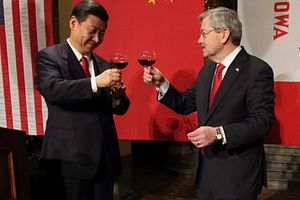Tuesday evening, reports emerged that Terry Branstad, governor of the U.S. state of Iowa, had accepted U.S. President-elect Donald Trump’s offer to become the next U.S. ambassador to China.
Branstad, who over the course of six terms (with a break from 1999-2011) became the longest serving governor in U.S. history last year, continues a trend of recent U.S. ambassadors to China — with the exception of incumbent Max Baucus — having a past leading a U.S. state. Baucus’ predecessors Gary Locke and Jon Huntsman were the governors of Washington state and Utah respectively.
Branstad, an early and enthusiastic backer of Trump during the campaign, has a personal connection with Chinese President Xi Jinping, dating back to Xi’s time in Iowa in the mid-1980s in what was likely his first trip abroad as a younger cadre. Xi spent time in rural Iowa on an agricultural research trip; Branstad was governor of Iowa at the time.
In 2012, Xi, then the vice president and president-in-waiting of China, made a point of visiting Iowa (and Branstad) again on a trip to the United States. Reacting to Branstad’s appointment, China’s foreign ministry acknowledged this personal history, describing Trump’s pick as an “old friend.”
“We welcome him to play a greater role in advancing the development of China-U.S. relations,” Foreign Ministry spokesperson Lu Kang added at a press briefing earlier.
Neither the Trump campaign nor Branstad have publicly confirmed the appointment as of this writing.
Speculation emerged around Branstad’s possible involvement in the incoming administration’s China policy after a mid-November trip by the Iowa governor to China.
The trip also included a stopover in Japan and was portrayed by Branstad’s office as a standard gubernatorial trade mission. (China, thanks to its hunger for agricultural products, is Iowa’s second largest trading partner after Canada.)
Rumors of Branstad’s candidacy for the top U.S. diplomatic post in China were amplified when Trump, speaking in Iowa two days before the election, said that Branstad would be a “prime candidate to take care of China.” Trump added that “I think there is no one that knows more about trade than him.”
Appointing Branstad after last Friday’s historic phone call between Trump and Taiwanese President Tsai Ing-wen and a series of tweets blaming China for currency manipulation and militarization of the South China Sea sends a reconciliatory message from the incoming administration toward Beijing.
Though China did not publicly rebuke the incoming administration, the foreign ministry suggested that it had presented its “firm position” on Taiwan to the “relevant party” in the United States.
Picking Branstad also suggests a softer approach from the incoming administration on trade with China; Branstad has a strong record of pro-free trade statements and stands at odds with Trump in this regard.
The U.S. president-elect has strongly criticized Chinese trade practices for American job losses and promised, among other measures, punitive tariffs against Chinese goods.
Branstad’s appointment is additionally notable for being the first U.S. ambassadorial appointment by the Trump administration — outside of the cabinet-rank United Nations ambassador post.
News of Branstad’s appointment comes without confirmation of who Trump will tap to lead the U.S. Department of State. Former U.S. Ambassador to China Jon Huntsman is reportedly in the running for the position.

































